Ingredients to look for and ones to avoid
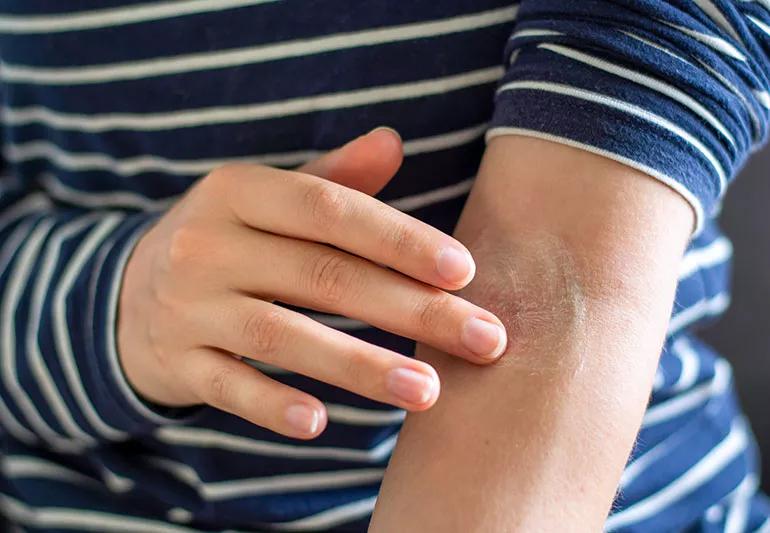
If you have atopic dermatitis, the most common type of eczema, you’re probably always in search of the holy grail of skin care products. Your skin is extra-sensitive and prone to itchiness, dryness and other uncomfortable symptoms — but the aisle full of lotions and creams seems endlessly baffling.
Advertisement
Cleveland Clinic is a non-profit academic medical center. Advertising on our site helps support our mission. We do not endorse non-Cleveland Clinic products or services. Policy
Which ingredients will help, and which will make things worse? When it comes to treating eczema, bland, minimalist products are best. “I always recommend a simple, short ingredient list,” says dermatologist John Anthony, MD.
Dr. Anthony helps you sort through the confusion to determine which products are right for you.
From creams and lotions to ointments and oils, it can be hard to know what’s what — and what’s best. Before you start looking into ingredients, it’s helpful to understand the difference among products.
Advertisement
If you’re looking for a one-size-fits-all answer to the best product for your eczema, you won’t find one. “It ends up being about each patient’s preference and tolerance,” Dr. Anthony says. “What feels good on your skin is probably the best product for you.”
But knowing your options — including what products are available, what they do and what ingredients to look for — can go a long way in helping you decide.
Hydration makes for happy skin. “If you have eczema, it’s extremely important to keep your skin hydrated,” Dr. Anthony says.
In looking for an eczema product, there are three categories of ingredients to know about:
“You see all three of them in some of the products we use for eczema,” Dr. Anthony explains. And some popular ingredients pull double duty, acting, for example, as both humectant and occlusive, or emollient and occlusive, which can make things confusing.
He walks us through the categories, including ingredients to look for.
Emollients fill in the cracks in dry skin, which helps soothe, soften and ultimately heal. “They restore some of the natural fats in the skin,” Dr. Anthony says. “Fats are important in enabling the skin barrier to exist, and emollients help repair your skin barrier.”
But some emollients are better than others for eczema. Good choices include:
Ceramides — fats derived from plants or animals — are especially good for eczema. “Data shows that products that are high in ceramides work well for a lot of patients with eczema due to their anti-inflammatory effects,” Dr. Anthony says.
“Humectants are designed to try and draw moisture into the skin,” Dr. Anthony explains. They attract and bind to water, pulling it from the air and from deeper within your skin. They include:
Applied on their own, humectants can cause stinging and burning. Instead, eczema creams combine these ingredients with more soothing emollients and occlusives.
Occlusives are like a sealant, keeping moisture and hydration where they belong — in your skin. Without an occlusive, some of that goodness is lost to evaporation. But adding an occlusive on top seals the deal by literally sealing hydration and moisture into place.
Occlusive ingredients good for eczema include:
Advertisement
Vaseline®, which is made of petroleum jelly, is both an emollient and an occlusive. For the most part, it’s safe to use on eczema. But like other occlusives, petroleum jelly alone won’t moisturize your skin.
“You have to get the moisture in there first, whether from other ingredients or from water, and then seal it in with a topcoat,” Dr. Anthony explains. “That’s what we call occlusive therapy.”
Research continues to evolve to identify the best ingredients for treating eczema. Dr. Anthony shares two ingredients that have been found to be particularly soothing.
Remember: What works well for the general population isn’t always best for eczema. There are lots of products that can be hydrating, soothing and overall beneficial to people who have standard dry skin — but many of those same products can worsen dry skin caused by eczema.
Advertisement
Dr. Anthony says his eczema recommendations are informed by his work with patients who have contact dermatitis (basically, allergic reactions affecting the skin). Skin with eczema is especially sensitive, so although you may not currently be allergic to any of the products he recommends avoiding, it certainly can’t hurt to go without them.
“For patients with atopic dermatitis, there’s more chance of exposure to possible allergens, which can complicate their condition and treatment,” he says. “So while none of these are absolutes, I usually start with some general rules.”
A good rule of thumb is that if you love the way it smells, don’t use it on your eczema. “I always recommend fragrance-free,” Dr. Anthony says. “Some people love scented products, but the botanicals used in lotions and creams can be a problem in terms of allergic contact dermatitis for people with eczema.”
He encourages eczema patients to use bland products that don’t have fragrances or floral-based ingredients and to avoid ingredients like:
Products with higher linoleic acid and lower oleic acid levels are best for eczema, but olive oil has the wrong ratio. “We don’t recommend olive oil because it has the wrong balance of fatty acids,” Dr. Anthony explains.
Advertisement
In fact, olive oil can actually make eczema worse by damaging your skin barrier. So, keep it where it’s most helpful — in the kitchen, not on your skin.
While essential oils may provide relief for some people, Dr. Anthony doesn’t recommend them because they can lead to allergic reactions. Even if you’ve used them in the past without issue, you can develop an allergy over time. “It’s usually best not to go down that path,” he cautions.
Also called “wool oil,” lanolin is a common ingredient in lotions and creams. Some people with eczema may find it helpful, but Dr. Anthony doesn’t typically recommend it because it can be (or can become) an allergen for people with eczema.
Once a common ingredient in aqueous creams, SLS is now thought to worsen eczema by causing stinging, itchiness and redness. Studies show that non-SLS aqueous creams are less likely to irritate skin than aqueous creams that contain SLS. These days, many products have been reformulated to remove the ingredient.
“We have a tendency in our culture to want to use organic, vegan products,” Dr. Anthony says, “and while they may have benefits, they often have a negative impact on skin with eczema.”
Organic, vegan products tend to be botanical-heavy, and scented with nature’s most appealing fragrances. But skin with eczema is more reactive to allergens, and organic doesn’t equal hypoallergenic. You can still be allergic or sensitive to a natural ingredient.
“Oftentimes patients say, ‘I don’t know why my skin is getting worse. I only use organic vegan products,’” Dr. Anthony recounts. “But they just happen to be allergic to those products.”
Dr. Anthony shares some of the key steps in applying your eczema products of choice.
If your eczema isn’t letting up, see your dermatologist, who may write you a prescription for something stronger.
There are other eczema treatment options, too, like JAK inhibitors (medications that prevent inflammation from inside of your cells) and biologics (injections or infusions that block functions of your immune system that affect eczema).
In short, there are a variety of ways to treat and control your eczema, so if over-the-counter products aren’t doing the trick, seek guidance from your dermatologist about what might work best for you. “There are new products coming out all the time,” Dr. Anthony encourages.
Learn more about our editorial process.
Advertisement
There’s not one specific cure-all diet for eczema, but it helps to keep track of what you eat and when you experience symptoms
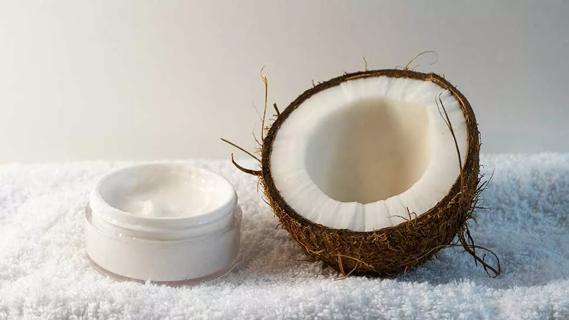
Colloidal oatmeal, petroleum jelly and other around-the-home products can help provide needed relief

Your body’s natural response to stress can lead to painful skin irritation

From hyperactive immune response to disordered nerve connections, the itch is real
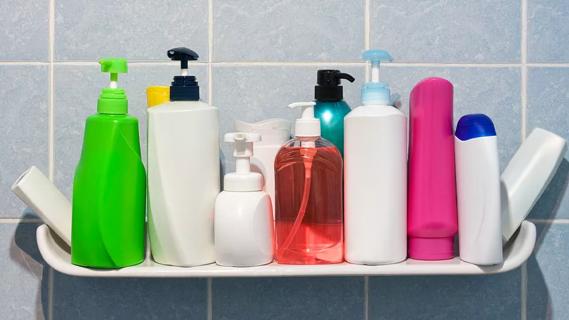
Eczema triggers are different for everyone, but there are some common ways to manage and prevent flare-ups

Hot or cold, your eczema can have flare-ups during multiple times of the year
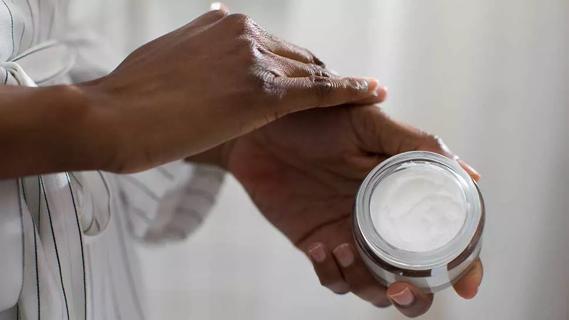
Keep your showers short and lukewarm, and moisturize promptly after with a cream containing ceramides
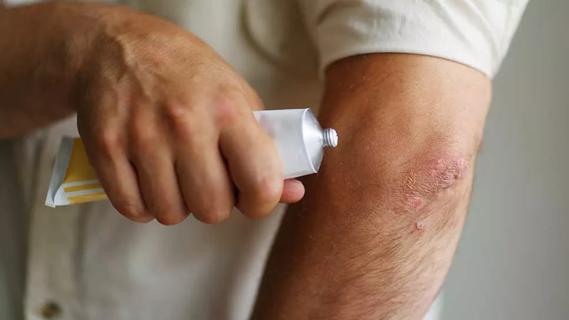
Steroids, self-injections and medications can be game changers

Wearing a scarf, adjusting your outdoor activities and following your asthma treatment plan can help limit breathing problems

Your diet in the weeks, days and hours ahead of your race can power you to the finish line

When someone guilt trips you, they’re using emotionally manipulative behavior to try to get you to act a certain way